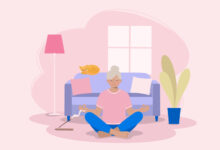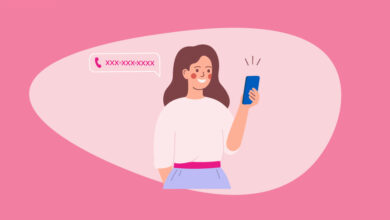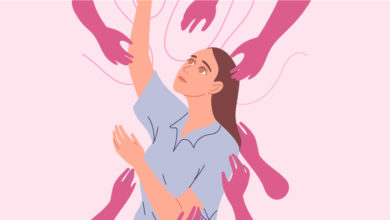Does your average weekday look like hopping from your little screen when you wake up, to your medium-sized screen during work, taking breaks looking at your little screen, winding down by looking at your big screen, and getting ready to go to sleep by looking at your little screen again?
You’re not alone. Technology is awesome, and we love a good Instagram binge as much as the next person, but it’s no secret that the majority of us get too much screen time. Society as a whole is starting to become more and more aware of the negative effect that excessive screen time can have on people.
Too much screen time can take you out of the moment, worsen procrastination, and keep you from making connections IRL. Not only that, but excess screen time can also wreak havoc on your physical and mental health. Much of this is thanks to blue light.
What Is Blue Light?
About one-third of the light we can see is blue light, sunlight being the biggest source of it. Blue light can also be found in artificial sources like your phone, computer, LED TVs, fluorescent lights, and whatever device you’re reading this on!
The visible light spectrum makes up all the light that humans can see. Blue light, however, has the highest energy, shortest wavelength, and vibrates within the 380 to 500 nanometer range.
Even though blue light doesn’t have the best reputation, it certainly isn’t all bad. The Earth and everyone who lives on it depends on the sun, and thus the blue light it provides. Blue light is essential for regulating the body’s circadian rhythm, elevates your mood, and helps with brain function and memory.
How Does Blue Light Affect The Body?
Yes, we depend on blue light from the sun to keep us healthy, moving, and grooving, but what about the effects of artificial blue light? Considering that people across the world spend an average of 40% of their waking hours on a screen connected to the internet, we must understand the potential downsides of being so connected.
Your Eyes
One of the most obvious parts of the body that blue light affects is the eyes. You can probably vouch for this yourself whenever your eyes feel strained or you get a little headache from too much screen time.
Time for a little biology lesson. The front of your eyes are composed of the cornea and lens, and behind them is the retina, which is where cells convert light so that your brain can process it into images. Human eyes are good for a lot of things but are not great at blocking light. That means that nearly all visible blue light that you’re exposed to reaches back into your retinas.
Over time this can cause vision problems thanks to damaged retinal cells. It may also increase your risk of developing growths in the eyes, eye cancer, and cataracts.
Blue Light and Your Sleep
Blue light, unlike red light, can make a big difference when it comes to your sleep hygiene. Exposure to it suppresses the secretion of the hormone melatonin, which is essential for regulating the sleep-wake cycle. For a lot of people, this means an irregular sleep schedule or not getting quality sleep.
It makes sense considering the blue light humans used to be exposed to came from the sun, which goes down when it’s time to start winding down. Our blue light hours have been extended exponentially thanks to lights and screens. Poor sleep has been linked with all sorts of long-term health issues like diabetes, heart disease, depression, obesity, and cancer.
Blue Light and Hormones
Melatonin isn’t the only hormone that can be affected by artificial blue light. When your circadian rhythm is disrupted, it can also affect your reproductive health.
Your reproductive health depends on finely tuned-hormonal shifts throughout your menstrual cycle (if you have one). Ovulation is dependent on a regulated circadian rhythm, when this is thrown off, it can lead to reproductive health issues like PCOS, and problems with fertility.
Protecting Yourself From Blue Light
The most obvious way of protecting yourself from the effects of blue light is by minimizing your screen time. Unfortunately, that’s not always a choice. There are ways however you can help mitigate the effects of blue light.
Here are a few tips:
- Blue light glasses may help protect the eyes during screen time.
- Avoid screen time before bed (30 mins to 2 hours before going to sleep).
- Download a blue light filter (like Flux) on your devices.
- Use the 20-20-20 rule by taking a 20-second break every 20 minutes to look at something 20 feet away.
- Always wear your corrective lenses when using screens if needed.
- Use a red light at night in your home.
Screen Time: Moderation is Key
One of the hard things about blue light and human health is that it’s all so new. Although we can see short-term effects, there’s no way to know how excess blue light can affect your health in the long run. Nor is there one definition of “excess”, especially considering how many people depend on screens for their livelihood.
Our devices aren’t going anywhere anytime soon, nor do we want them to. They offer so many benefits, accessibility, and entertainment. That being said, we do need to be mindful of how much screen time we’re exposed to.
Having a hard time cutting back on screen time? Here are some hacks:
- Try an app that monitors your screen time.
- Get a real alarm clock and sleep with your phone outside of your room.
- Establish a morning and bedtime routine that you do after you put your phone down at night and before looking at it in the morning.
- Turn off all unnecessary notifications on your phone and computer.
Life is about balance. The same is true for your screens and blue light. Typically, the more mindful you become of how too much screen time makes you feel, the easier it is to start to cut back. Once you realize that you sleep better, feel better in your body, and have more time to do the things you love, it will get easier to establish healthy boundaries with your screens.










